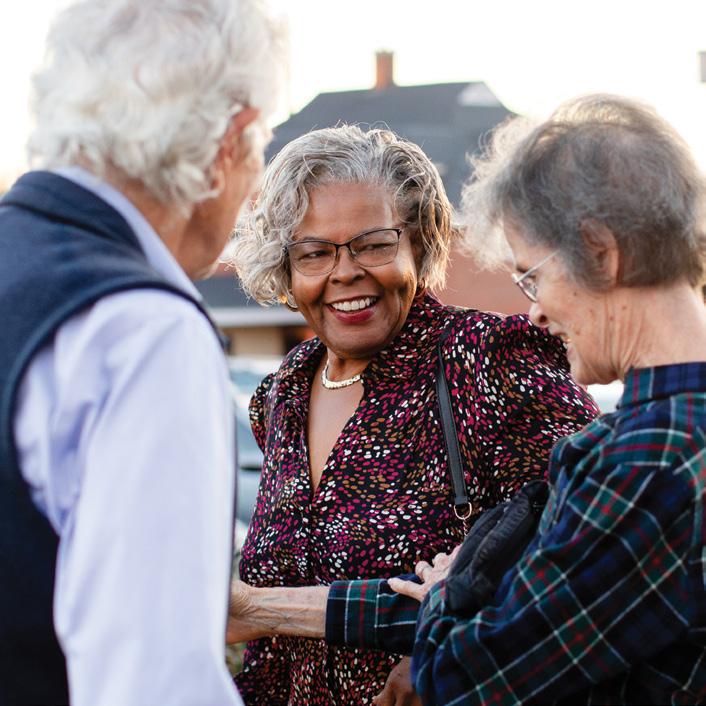








2025 Report to the Community

Our work is rooted in a deep love for community and a shared belief in what’s possible when we come together with purpose. We’re excited to share our new mission, vision, and beliefs—refinements that reflect both who we are today and who we aspire to be in partnership with our community.
OUR MISSION
We foster meaningful connections and link resources to purposeful action, creating a brighter future for all who call Forsyth County home.
OUR VISION
A vibrant, sustainable community where everyone thrives.
OUR BELIEFS
1 Relationships are our most valuable resource. We strive to build meaningful relationships and partnerships by listening to understand and seeking diverse perspectives to ensure that our work is informed by and in collaboration with the community.
2 Equity makes our vision possible. We seek justice in all our actions, ensuring everyone in our community can access the resources and opportunities needed to thrive.
3 Learning is an ongoing journey. We commit to continuously seeking and sharing knowledge with community partners and donors, embracing change, and striving for improvement to ensure our efforts lead to meaningful and sustainable progress.
4 Philanthropy is a powerful tool for change. By inspiring and facilitating generosity, we engage with members of our community to contribute in ways that are meaningful to them, driving purposeful and lasting change together.
How do we love our
communities?
the truth is
We always have We always will And since Love is a verb We can show you, Way better than we can tell you
From the poem ‘What Does It Mean to Love a Community?’ written by Christian Paige for CF Leads and read to open our 2025 Community Meeting on Economic Mobility.
Last year in partnership with our donors, community partners, and volunteers, we:
Awarded $92M in grants to nonprofit organizations in Forsyth County and across the country
Directed more than $977,000 to support relief for our neighbors in Western NC impacted by Hurricane Helene
Awarded scholarships to 573 students totaling over $1.67M
At its root philanthropy means love of mankind. Community foundations often model how we can collectively love our communities. For 106 years The Winston-Salem Foundation has embodied a deep sense of care for everyone who calls Forsyth County home. As the needs and opportunities in our community shift, we continue to evolve to help build a vibrant, sustainable future.
While this moment is a challenging time for both our country and Forsyth County, we have a powerful opportunity to reimagine how we come together to support public education, economic mobility, and our community’s future. As we determine the best path forward, we are grounded in fundamental values that guide what it means to demonstrate our love— relationships are our most valuable resource; equity makes our vision possible; learning is an ongoing journey; philanthropy is a powerful tool for change.
We know our community already holds the answers; it’s about aligning resources to bring shared solutions to life. We also believe deeply in our infinite capacity to love this community and its people. We always have. We always will.
In community, LaTida & Peggy
LaTida Smith President
The Winston-Salem Foundation
Peggy Reingold Chair
The Winston-Salem Foundation Committee
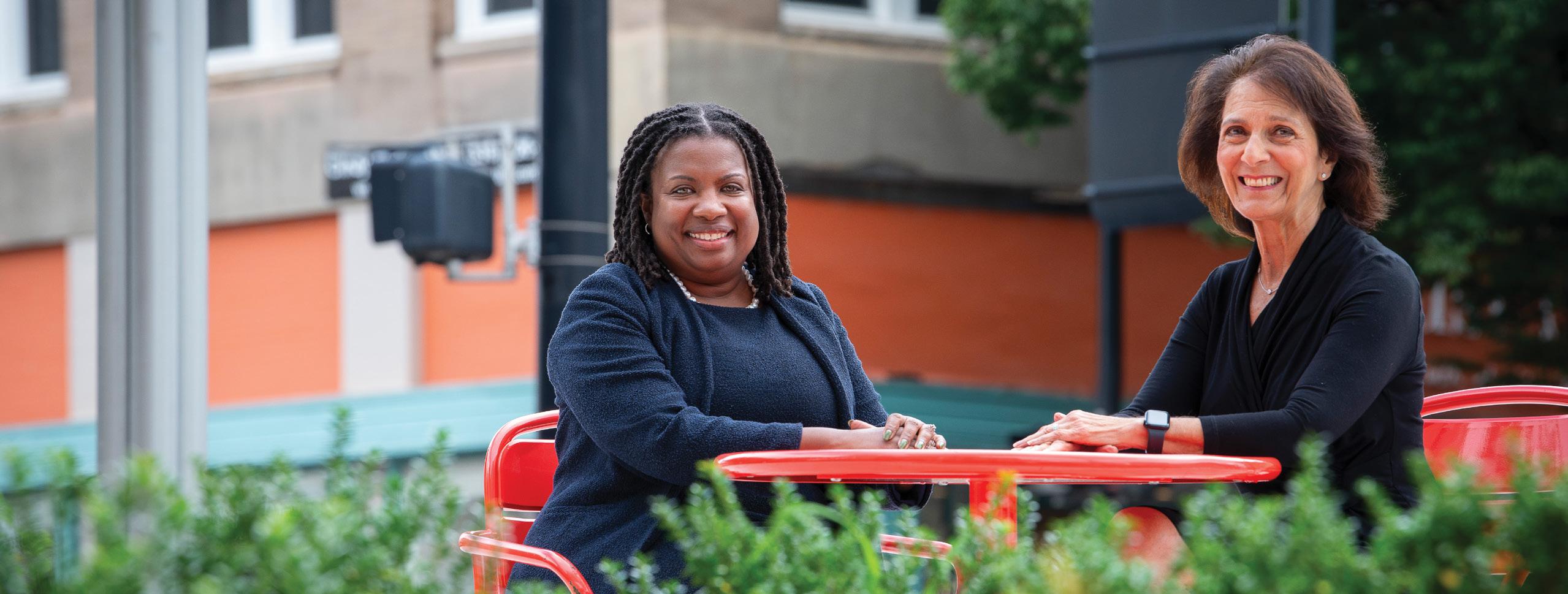
Our staff and board were pleased to share our new mission, vision, and beliefs, as well as our new Strategic Direction to guide our work in the future. We crafted these elements through a process of listening and reflecting on how we can best show up as your community foundation. We look forward to continuing this work together, rooted in shared values and a bold vision for Forsyth County’s future.
Foundation staff gather before the Community Meeting (right).


A 2014 landmark study by economist Dr. Raj Chetty ranked Forsyth County near the bottom—third worst—for economic mobility among counties in the United States. The data revealed what many in our community already know: A child’s future is too often determined by the zip code in which they grow up. At our 2025 Community Meeting, Dr. Chetty (left) shared new data reflecting that Forsyth County is making progress in the right direction. While the national rate of economic mobility for low-income families declined 4.2% during the last decade, Forsyth County experienced a 2.7% increase, one of the highest rates of increase across the country. As this research makes clear, community matters. It shows us what’s possible when we invest in families, neighborhoods, schools, and systems that have been under-funded for decades.
Snapshots from the Community Meeting (below).



In 2024, the Foundation committed more than $4.9 million in grant funding to support nonprofits, community groups, and educators who are making a difference across Forsyth County. In the weeks that followed Hurricane Helene, we processed 550 donor-directed grants totaling more than $977,000 for relief efforts in Western North Carolina. Additionally, thanks to donors to our unrestricted funds, the Foundation was able to deploy $25,000 to support recovery efforts coordinated by the North Carolina Community Foundation and the Community Foundation of Western North Carolina.
To celebrate our 105th birthday, Foundation staff volunteered at Second Harvest NWNC, packing more than 3,000 meals for our neighbors in Western NC (right).




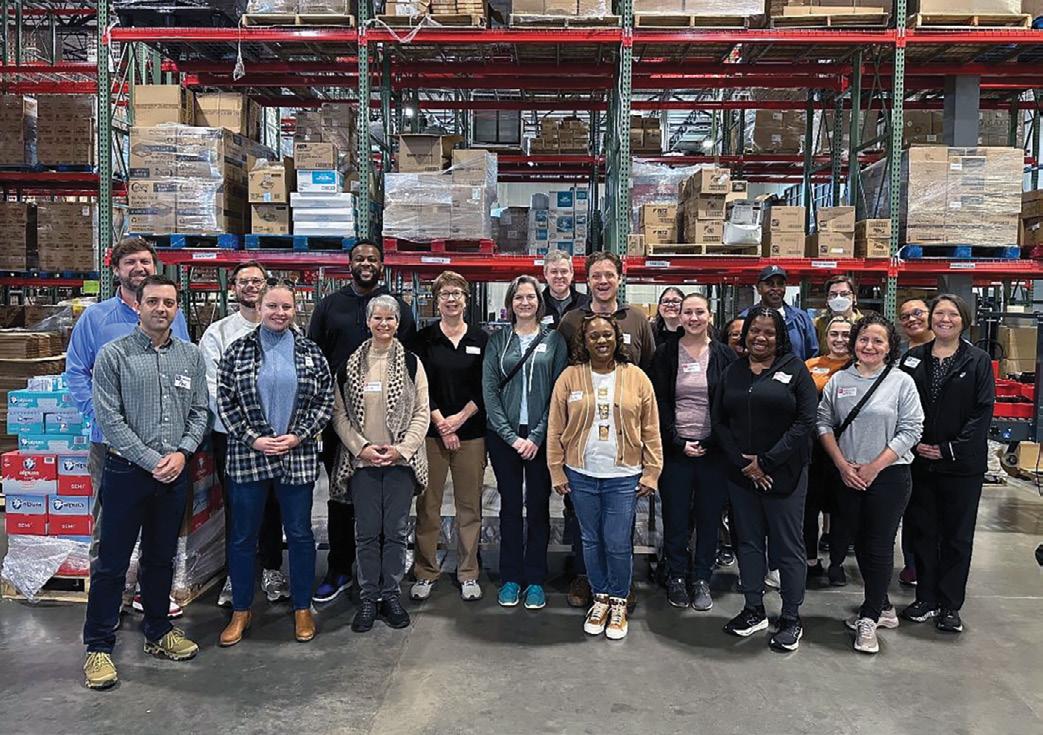

Our Strategic Initiatives give voice, leadership, and decision-making to people who have historically been left out of philanthropy. This year marked the 20th anniversary of community-led grantmaking through The Women’s Fund of Winston-Salem and Youth
Grantmakers in Action. And 25 years since its inception, the Black Philanthropy Initiative exceeded a $2 million campaign goal to support local Black communities. These milestones are a testament to the power of collective giving and the impact we can make when we invest in community change together.
Speakers gather for the Women’s Fund Luncheon (top left). Staff and supporters share joy at BPI’s Fundraiser (top right).
YGA members stand with grantees at the Year-end Celebration (left).
At the Foundation’s 2025 Community Meeting, we welcomed renowned economist Dr. Raj Chetty to share powerful insights on the drivers of economic mobility and how communities like ours can help create better outcomes for children and families. His talk left many of us inspired to think differently about what’s possible for Forsyth County.
The following is an excerpt from Dr. Raj Chetty’s talk at the Foundation’s 2025 Community Meeting. Read more at: wsfoundation.org/blog

Average Household Income at Age 35 for Children Born in 1978 whose Parents Earned $27K (25th percentile)
$45.5K
$33K
Las
$30K
$20K Portland
$30K

Source: Chetty, Hendren, Kline, Saez (QJE 2014)
$31K
A central feature of the American Dream is the idea that through hard work, any child, particularly children born into low-income families, should have a chance to move up the economic ladder. Certainly, it was that aspiration that drew my own parents to come to this country, and countless other immigrants. However, data shows that there’s an enormous amount of variation in children’s chances of rising up across different parts of America.
$55K
There are some parts of the country like the rural Midwest—for example Dubuque, IA—where kids raised in families making $27,000 now make $50,000 a year on average. That’s a substantial amount of upward mobility in a single generation. Yet there are other places like the Southeast, where kids growing up in families at that exact same income level, one generation later are not doing any better than their parents were. Or in some cases even have lower incomes on average than their parents did.
At Opportunity Insights, we analyze the geography of economic opportunity in America using information from anonymized tax returns to map children back to the county in which they grew up. We constructed a very simple measure of upward mobility by asking: Suppose you grew up in a low-income family as a child. How much do you, yourself, earn when we look at your tax returns at 35 years old?
There used to be parts of the United States, like California and the Northeast, where you had a pretty good chance of reaching the middle class if you were a white kid growing up in a low-income family. But, beginning with children born in 1992, that’s no longer the case. There’s a very real sense in which economic opportunity or a shot at achieving the American dream is slipping away for a wide swath of Americans.
For Black children growing up in low-income families, it turns out that economic opportunity is improving, which is encouraging progress. But I want to emphasize something here: While we’re making progress in terms of narrowing racial disparities, we should not by any means mistake that for thinking that we’ve closed racial disparities. There are still completely different sets of opportunities for Black kids and white kids in America.
Black children growing up in the very best places in terms of upward mobility can expect to have incomes of about $26,000 a year. That is worse than the very worst places for economic opportunities for white children, where they can expect to earn about $30,000 a year.
People may have in their minds that if one group gains, it comes at the expense of the other, but data shows the opposite. This underscores the fact that everyone either rises or falls together. Economic mobility is not a zero sum game.
If you compare economic mobility data in Winston-Salem with 1930s redlining maps, you’ll notice an incredible resemblance. It’s a pattern we see in cities across America. The exact neighborhoods that were denied access to credit nearly 100 years ago tend to have the lowest levels of economic mobility today. Now, why is that? It’s obviously not a direct consequence of redlining at this point, but it reflects the long legacy of historical factors.
In fact, differences in economic mobility can play out at a hyper-local level. It’s not about what’s happening nationally—it’s about what’s happening in one neighborhood versus another neighborhood, one side of the street versus another side of the street, one school versus another school. So, the main message I want you to take away is that change is possible. I think economic opportunity—while it has long standing historical roots to practices of the past like redlining—nevertheless is something that we can change through a multisector collaborative effort.
In Forsyth County, we can reclaim the promise of the American Dream by aligning resources to support community-led change. Here’s how:
1 EXPAND ECONOMIC OPPORTUNITY
To reverse stagnant mobility, we must increase our investments in what works: strong schools, early childhood education, living-wage jobs, workforce development, mentorship, and career pathways for youth and adults.
2 STRENGTHEN SOCIAL CONNECTION
Programs that bring people together across lines of race and income—like mentoring, integrated schools, inclusive civic spaces, and leadership pipelines—build the kind of trust and connection that are essential for thriving communities.
3 ADDRESS THE LEGACY OF DISCRIMINATION
We must name and undo the harm caused by discriminatory policies like redlining and segregation by supporting affordable housing in high-opportunity neighborhoods, reforming zoning laws, and strategically investing in communities that have been left out for too long.
Explore more data and connect with organizations driving change at wsfoundation.org/economic-mobility
To partner with the Foundation and help us invest in organizations that are moving the needle for economic mobility, contact our donor team at giving@wsfoundation.org
HOW WE GIVE IS WHO WE ARE.
As a community foundation, we shine a spotlight on community strengths and possibilities to honor the extraordinary things local residents do every day to make life better for those around them. On this and the following pages, you’ll read about just a few of the hundreds of people and organizations we collaborate with to strengthen Forsyth County.
LAUREN MURPHY
As she was preparing to start law school in Vermont this fall, Lauren Murphy reflected on all the support that helped her succeed as an eager young student at Appalachian State University nearly a decade ago. Growing up in Pfafftown and attending Reagan High School, Lauren always felt her best when surrounded by community—whether being cheered on by her fellow soccer teammates or volunteering at a local food pantry. “My community got me to where I am today,” said Lauren, “and I believe that when we all contribute in ways big and small, we can make a difference together.”
It’s true that access to education is still one of the most impactful ways for young people to achieve the American dream of making a better future for themselves. However, there can be many barriers that hold people back and Lauren recognized how financial support can help level the playing field. “I received scholarships myself, so I understand that extra support matters. The reality is that college has become so expensive and there’s also a lot of life challenges to navigate along the way,” Lauren shared. Indeed, supporting young people with wraparound services and financial stability ensures that prosperity is within reach—not just for some, but for all.
With a successful career at Oshkosh Corporation in Wisconsin, Lauren was able to pay off her student loans and felt compelled to give back to her hometown in a meaningful way. She turned to The Winston-Salem Foundation for insights and ideas about how to make the most impact. Through conversations with the Foundation team, Lauren was inspired to establish the Murphy Szabo Scholarship Fund to help Forsyth County students fill the financial gap to go to college. The name of Lauren’s fund pays homage to both her mother’s and father’s family names, making it especially meaningful to her. “My goal is to help make education accessible and equitable because it truly takes a community to support you on your journey,”
said Lauren. Now Lauren’s fund will be pooled with 150 other scholarships funds to ensure hundreds of local students can achieve their dreams.
By taking the time to meet with the Foundation, Lauren learned about ways to give back that she didn’t know about before, including the collective giving model of The Women’s Fund of Winston-Salem. “I was so happy to join The Women’s Fund to support women and girls in Forsyth County. I’m excited to help address barriers and be part of something bigger than myself,” she shared. As a Women’s Fund member, Lauren will get a chance to vote on grant decisions and learn more about issues impacting women locally.
“My goal is to help make education accessible and equitable because it truly takes a community to support you on your journey.”
LAUREN MURPHY Fundholder and Women’s Fund member
It’s not often that a young person has the vision and means to give back to their community in a financial way, but Lauren wanted others to know that giving can take many forms, and all giving is important. Lauren noted, “I think the word philanthropy can be a bit intimidating, but it’s the meaning behind it that matters. I’m very thankful to The Winston-Salem Foundation for their guidance and support to help me pay it forward to the community that raised me.”

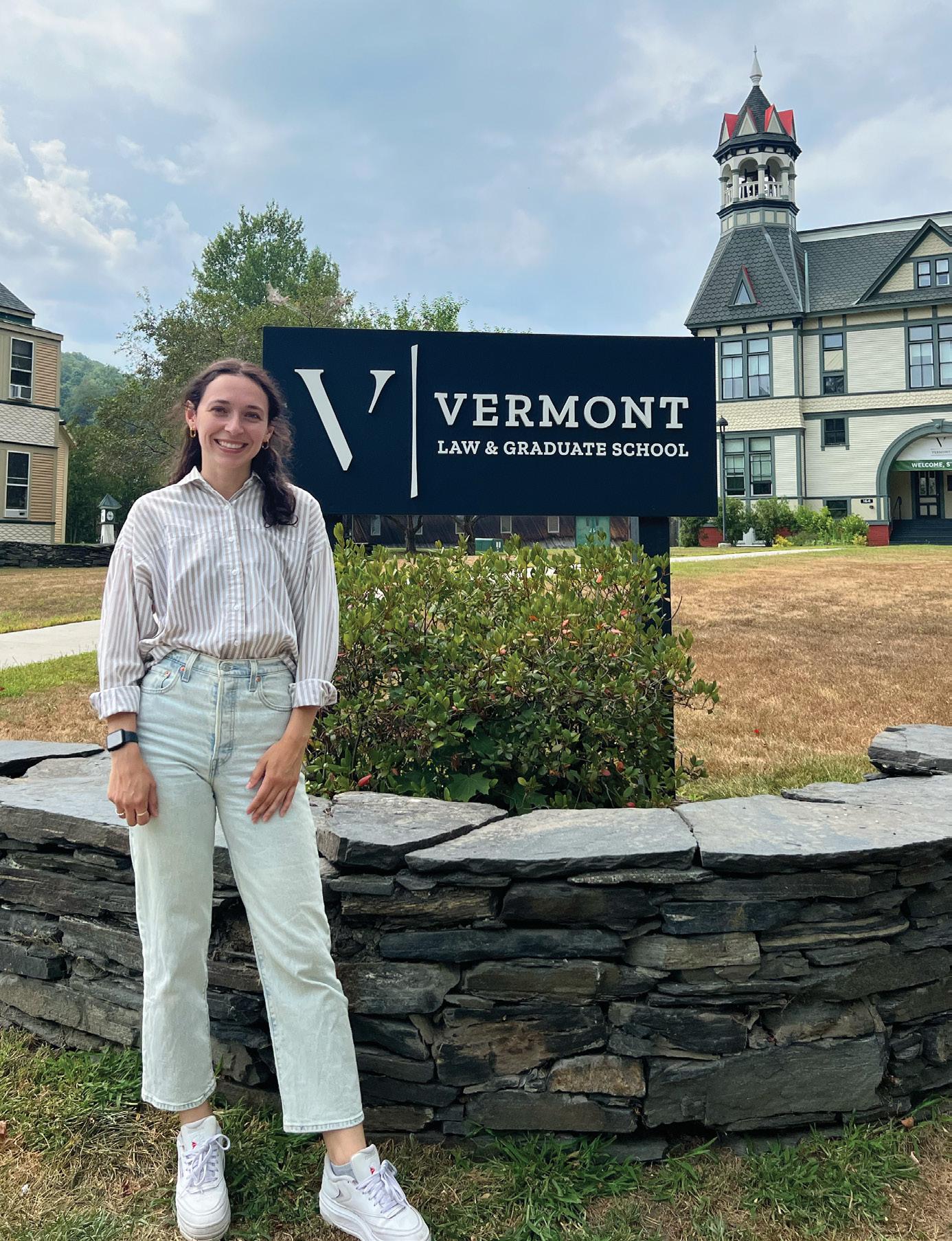
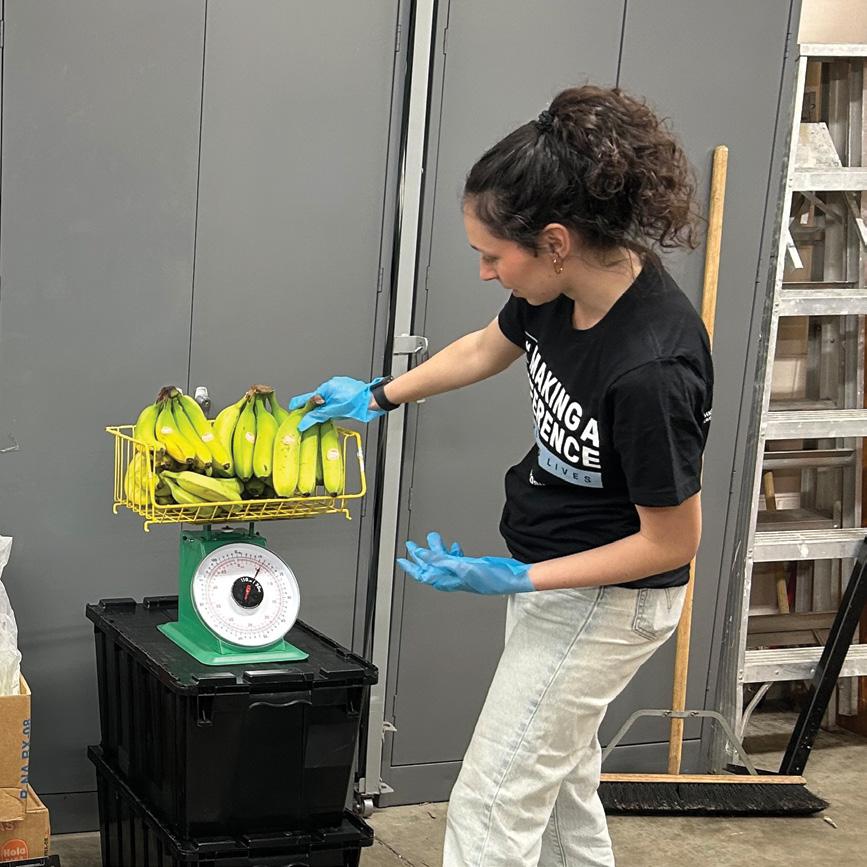
Lauren stands with her teammates at a high school track meet (top left).
Volunteering in action; Lauren supports a local food bank (top right).
The 2025-2026 school year begins as Lauren moves to Vermont for law school (left).
Lauren and her mom celebrate her graduation from Reagan High School (bottom).
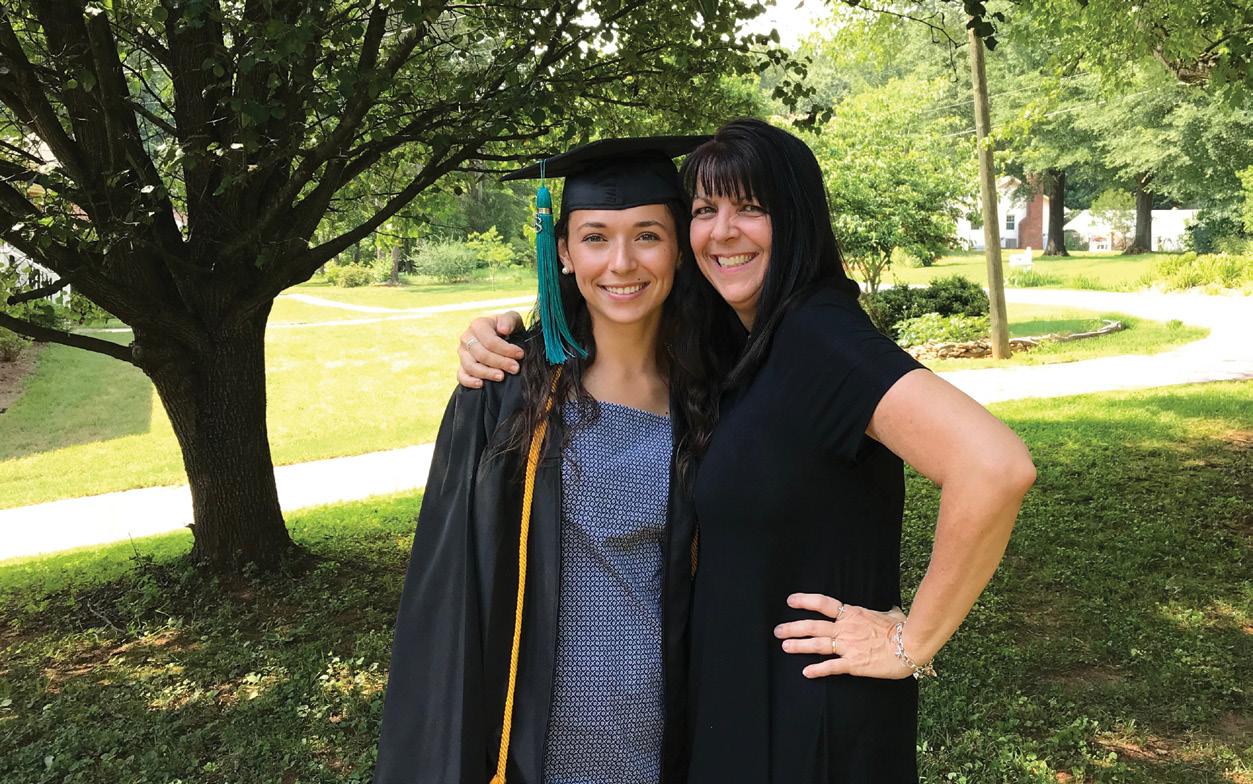

“By partnering with The Winston-Salem Foundation, almost everyone can create a legacy and help make a bigger impact in their communities by pooling their funds with others.”
DAVID BAILEY Charitable Partner
The Bailey family has been deeply rooted in Winston-Salem for more than 100 years, with close ties to the neighborhood surrounding Reynolda Road and what is now Wake Forest University. Today, Wesley Bailey is celebrated for his esteemed career as a lawyer, but his legacy goes well beyond the courtroom. A true Winston-Salem man, Wesley is known for being one of the longest running members of the Moravian Easter Band in Old Salem, and a founding director of Arbor Acres Methodist retirement community where he now resides.
When Wesley began his private practice in 1955, lawyers were expected to oversee a variety of civil and criminal matters. Back then, it was typical for Wesley to have his hands in capital cases, business disputes, will caveats, or real estate transactions in a given week. After serving on the North Carolina General Assembly and the Judicial Council of the worldwide United Methodist Church, Wesley began to think differently about his practice, focusing more on his knack for forming meaningful relationships by helping people with their wills and estate plans.
Wesley’s partnership with The Winston-Salem Foundation began in the 1980s, around the time when R. J. Reynolds Tobacco Company was bought out by a private equity firm. Many long-time Reynolds employees had company shares and, when the buyout happened, they sought guidance on how to handle the proceeds with care and intention. Wesley was pivotal in connecting folks with the Foundation, where they could explore charitable tools to fit their circumstances and benefit the community in the future. “I would help spark the idea for people and I could trust the Foundation to work out the details and make it happen,” said Wesley.
Since that time, Wesley has helped link millions of dollars to charitable causes through the Foundation. All the while, inspiring his own son, David, to follow in his footsteps. “Dad’s idea, which was a good one, was to help people live on through philanthropy,” said David. “People feel a great satisfaction and sense of accomplishment in knowing that a fund established at the Foundation will bear their name and support the community in perpetuity.”
David Bailey joined his father’s practice in 1982, where he developed a hands-on approach to working with clients, driven by a desire to really get to know the people he works with. “I like to say our clients are our friends, and our friends are our clients,” said David.
Though the charitable landscape has changed since his father’s heyday, David’s love of learning and connection keep him centered in finding the best solutions for his clients. “Back in the old days, only the wealthy could establish a charitable fund because of the high cost and expense of administration,” said David. “By partnering with The Winston-Salem Foundation, almost everyone can create a legacy and help make a bigger impact in their communities by pooling their funds with others.”
When David works with a client who has charitable intentions, but is unsure how to make a difference, he knows the team at the Foundation can help.
“The Foundation’s strong reputation and local focus have been a huge draw for our clients. People want to see their giving applied right here in Winston-Salem— to support the causes they know and love.”
Thanks to Wesley and David, the Bailey family name will certainly live on through their intentional partnership with the Foundation and the charitable funds they’ve helped create for our community’s future.

When Lyvonne Bovell moved to Winston-Salem from Chicago in 2015, she was planning to slowly retire from a successful career in commercial real estate. Shortly after joining United Metropolitan Missionary Baptist Church (UMMBC), she was called back to the development world by her congregation’s desire to go beyond the sanctuary to support the community. Lyvonne recalled the early vision, sharing, “One Sunday after church, I stood in the parking lot and looked across Route 52, toward a thriving downtown. I thought, how can we bring that success to this neighborhood? How can we build a bridge to East Winston-Salem?”
It’s true that harmful practices of the past such as redlining, urban renewal, and segregation have left parts of Winston-Salem behind in terms of development and investment. The construction of highways like Route 52 disconnected East Winston-Salem from the city’s economic core, which continues to shape where people live and what opportunities are available to them even today. And in recent years, the cost of housing has skyrocketed, pricing many families out of safe and affordable housing options.
A dream to shift this dynamic and create a thriving community of hope and health is what inspired UMMBC to secure control of the adjacent properties around its sanctuary back in 2014. Building homes to be healthy, affordable, and accessible felt like the most impactful way to make it happen. The church also knew that reversing the legacy of discrimination would require a mission-aligned collaborative effort. That’s where the insight of Lyvonne and the leadership of the church came in handy; they knew that it would take intentional partners to bring this dream to life. “It wasn’t about putting up apartment buildings, it was about creating a community,” she shared.
By the time Lyvonne met Jaron Norman of Liberty Atlantic in 2019, she knew she’d found the perfect developer and contractor to complete the vision. With the church and developer footing the initial predevelopment costs, phase one of the development was now underway. They secured additional investments from Atrium Health, APG Capital, and Catalyst Impact to close the deal—resulting in a community of 198 below-market rate apartments and townhomes ideal for the city’s most essential workers and learners.

“The Foundation provided a $50,000 grant and a $1 million impact investment when few others were willing to commit. Their support was catalytic, helping us unlock an additional $30 million of investment.”
JARON M. NORMAN CEO, Liberty Atlantic
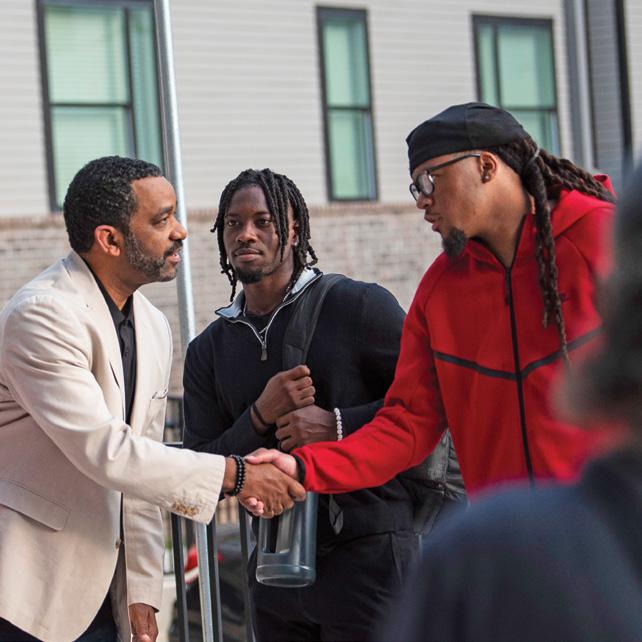
Phase two would result in more than 320 apartment homes available below market rate, including multiuse, micro-retail spaces on each floor and at ground level. To bring it all together, they partnered with The Maya Angelou Research Center for Healthy Communities to develop a signature connector space that would promote health access and onsite care navigation.
An early investment partner in the second phase was crucial to continuing the momentum. “The WinstonSalem Foundation’s impact investing program was a perfect, mission-aligned solution,” said Liberty Atlantic CEO Jaron Norman. “The Foundation provided a $50,000 grant and a $1 million impact investment when few others were willing to commit. Their support was catalytic, helping us unlock an additional $30 million of investment to ultimately bring the full mission and vision of the church to life.”
Ongoing partnerships with Atrium Health and WinstonSalem State University have allowed Metropolitan Village to center the needs of essential workers like nurses, police officers, and teachers at every turn. “It’s the singlelargest private investment ever made in East WinstonSalem,” said Jaron. “So, it was important for us to invest in the whole neighborhood, including streetscape improvements, enhancements to local childcare facilities, and security. Through intentional investment,
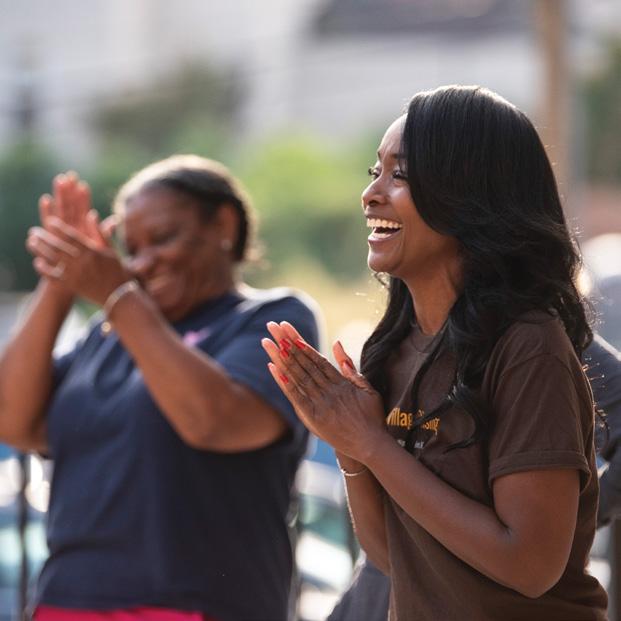
we’ve been able to reduce the area crime rate by 42%.” A grant from the Foundation helped fund these improvements, demonstrating how investments in high-opportunity neighborhoods can create ripple effects that make our whole community stronger.
Jaron added, “We believe in asset-based community development, meaning we look for community builders who have lived in and loved the neighborhood to be part of the project. Our Community Manager, Tracey Wolfe, grew up in East Winston-Salem. She brings a level of care to the community that is unmatched.”
Lyvonne, who now serves as COO at Liberty Atlantic, continues to be deeply involved in the project, cultivating a true community atmosphere. She’s often working on a tight timeline to furnish apartments for incoming residents who need to find an affordable home quickly for work or evolving life circumstances—always adding meaningful touches to make them feel like home. Lyvonne emphasized, “Metropolitan Village is more than a development of houses; it’s about addressing the spectrum of social determinants and critical gaps in care. We are setting a precedent for how communities can align housing, health access, and workforce stability to create a measurable, scalable system that benefits the community.”


“The youth who participate are so eager to make their community better. To make this world better. When they find YGA, it’s their lightbulb. It’s a chance to learn about philanthropy and the process of giving, but also an opportunity to learn how to be leaders in their own communities.”

Where do you go as a young person to make a difference in your community? For many that might be through their churches, a sports team, or volunteering on the weekends with their families. If they don’t have access to that kind of network, it can be hard to find ways to give back and connect deeply with others.
Twenty years ago, 14-year-old Megan Mills Anderson found her voice as an inaugural member of the Youth Grantmakers in Action (YGA) program through The Winston-Salem Foundation. The idea behind YGA was simple, yet unique—empowering young people to lead through philanthropy, to learn from each other, and to make decisions about how to fund community projects.
At the time, Megan had no idea this monthly afterschool program would have such a huge impact on her life. She reflected, “I can speak from experience that the youth who participate are so eager to make their community better. To make this world better. When they find YGA, it’s their lightbulb. It’s a chance to learn about philanthropy and the process of giving, but also an opportunity to learn how to be leaders in their own communities.”
Born and raised in Winston-Salem, Megan attended public schools and pursued higher education at North Carolina Agricultural and Technical State University in nearby Greensboro. After college, her commitment to her hometown deepened as she bought a home not far from where she grew up in East Winston-Salem. Throughout her early career as a public school teacher, Megan felt drawn back to YGA, returning on a regular basis to volunteer and assist.
Megan found a lot of joy in giving back to the community that had nurtured her, returning to a space where youth voices were not only heard but were at the forefront of change. She emphasized, “YGA is 100% youth led.
I don’t think people realize how important that part of the program is. These students are listening, learning, and making decisions in the room together. They put boots on the ground to get the word out there about grant opportunities and network with youth out in the community to make things happen.”
One aspect of the program turns out to be more beneficial than anyone could have imagined: developing social connectedness with others. In fact, data shows that places with greater social capital tend to have higher levels of upward mobility, often because children’s aspirations are shaped by the people around them. Programs that bring people together across lines of race and income—like mentoring, integrated schools, inclusive civic spaces, and leadership pipelines—build the kind of trust and connection that are essential for thriving communities.
“I’ve seen firsthand how important it is for students to build relationships across differences,” said Megan. “Since its early days, YGA has recruited students from across Forsyth County, including youth from private schools, public schools, and charter schools. Students get a chance to learn from each other and come to understand that just because they’re facing a challenge in their neighborhood, doesn’t mean that’s what’s going on right down the street or in another part of the county. More than that, they learn how to have civic discourse and how to come to consensus with their peers.”
Over time, Megan’s dedication and leadership skills made her a perfect lead facilitator for YGA. Today, she continues to foster a sense of community among the youth, just as YGA had done for her years ago. By day, Megan uses the skills she cultivated through YGA to help find solutions to workforce pipeline challenges at Atrium Health Northwest Area Health Education Center, facilitating conversations between educators and employers to help close the healthcare talent gap. She noted, “YGA is truly a one-of-a-kind program. I’m proud to be part of a program that not only shaped my life but continues to inspire and empower the next generation of leaders.”
YGA members get ready to announce their grantees at the
TOTAL ASSETS* $651,931,945 CHARITABLE FUNDS*
1,689 GIFTS $27,479,686 DONORS 1,417
*as of 12/31/24
$87.5M
2024 GRANTS (by fund type)
$4.9M
DONOR-DIRECTED (95%)
Grants advised by donors to support local and non-local organizations
FOUNDATION-DIRECTED (5%)
Grants the Foundation activates to strengthen Forsyth County
TOTAL CHARITABLE GRANTS
$92,466,389
ORGANIZATIONS SUPPORTED 2,107
STUDENTS & TEACHERS SUPPORTED
621
We’re committed to growing Foundation-directed resources to be able to respond to Winston-Salem’s opportunities and challenges, both now and in the future.
To learn more about directing your giving locally, get in touch with our team at giving@wsfoundation.org or call (336) 725-2382
For more detailed financial information, visit wsfoundation.org/financials
Make a donation of any size to support The Next Century Fund, Scholarships, the Black Philanthropy Initiative, The Women’s Fund of Winston-Salem, or Youth Grantmakers in Action.
Make a gift to any of the 1,600+ funds administered by the Foundation, including direct support for students and teachers in local public schools.
Visit wsfoundation.org/give
Whether you’re a nonprofit, a local educator, or a student seeking higher education, we have ongoing grant and scholarship opportunities to help support your goals.
Visit wsfoundation.org to learn more

2
Set up a Donor-Advised Fund or Designated Fund to support nonprofits that align with your philanthropic goals.
Establish an Unrestricted Fund, Field of Interest Fund, or Scholarship Fund to invest directly in local nonprofits and students.
Include the Foundation in your will or charitable gift plans.
Contact us at giving@wsfoundation.org or call (336) 725-2382
4
Volunteer with the Black Philanthropy Initiative, The Women’s Fund, or as a Foundation Scholarship Reviewer.
Support our nonprofit partners with time, expertise, or donations.
Call us at (336) 725-2382 to get connected or visit wsfoundation.org/volunteer
Our Strategic Direction is a community-powered promise, guiding The Winston-Salem Foundation forward through meaningful connections. It keeps us focused on our goals, acting decisively, and investing in a future where everyone has the opportunity to thrive. Our Strategic Direction: An Extension of Our Mission
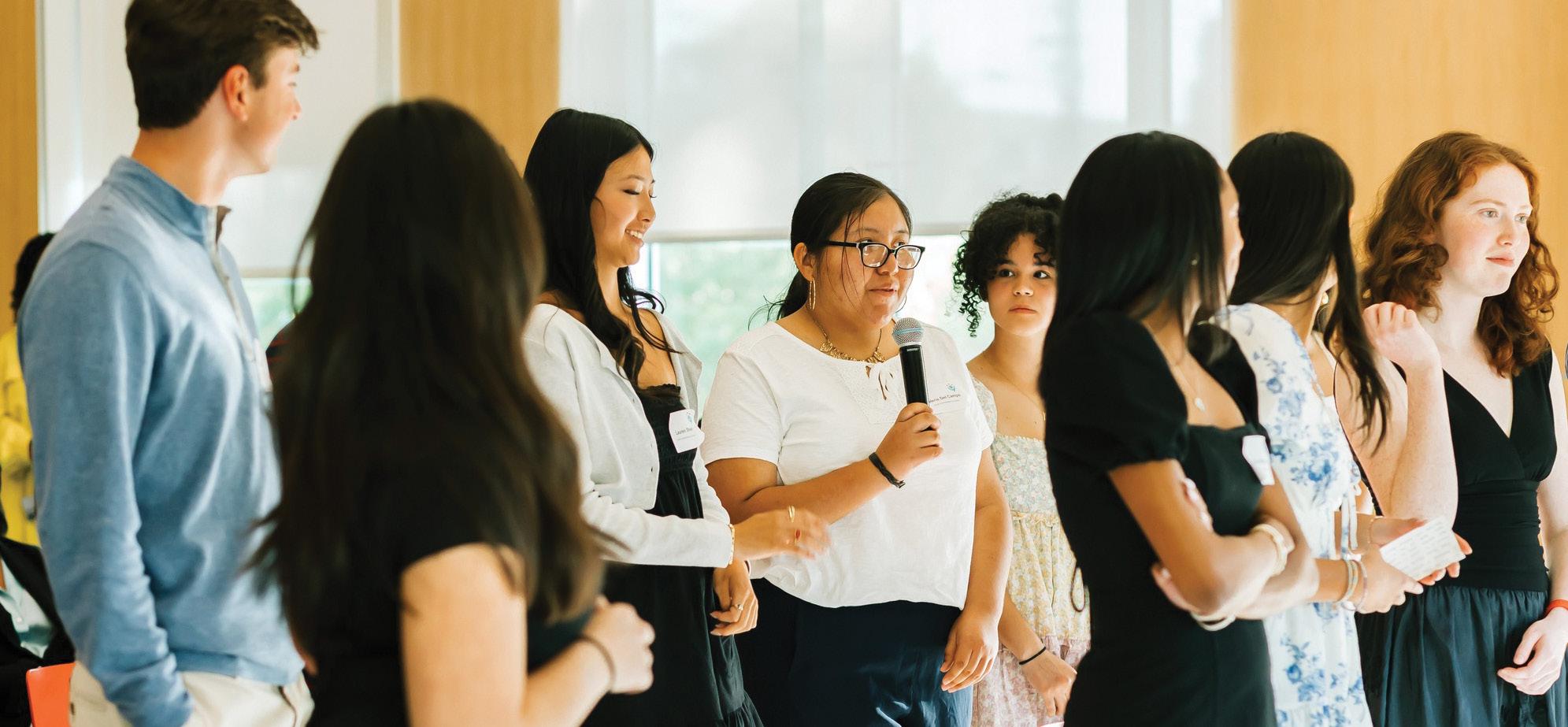
FOR MORE THAN 100 YEARS, COMMUNITY MEMBERS HAVE PARTNERED WITH US TO SOLVE PRESSING ISSUES IN WINSTON-SALEM AND BEYOND.
THE BURRESS FAMILY CENTER FOR PHILANTHROPY
Nonprofit organizations and groups are invited to use this collaborative meeting space to learn, connect, and share ideas. The Foundation is pleased to have hosted more than 2,200 community meetings in this space since 2015.
For more information on the facility, visit wsfoundation.org/meeting-space
Our board and staff are passionate and dedicated because we love this community, and we want to create a long-lasting legacy of impact with you.
Please reach out if you have questions or want to learn more about the work of the Foundation. Together we can accomplish our vision of a thriving Forsyth County for all.
Get in touch at wsfoundation.org/staff
Read about our dedicated board at wsfoundation.org/board



